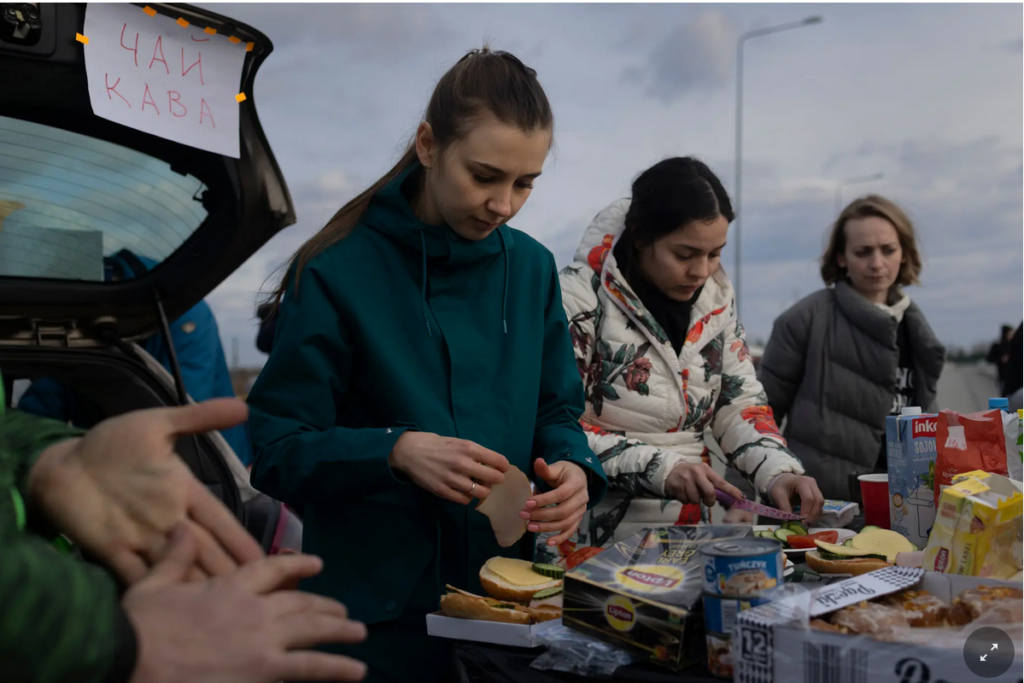Many people from the region took to the internet to show their support for Ukrainians fleeing. But, they also expressed bitterness at the treatment of Arab- and Muslimmigrants in Europe.
On Saturday, the spectacle of a mass flight from Ukraine resonated deeply in the Middle East. Many took to social media to show their support and to sympathize with those who were forced to flee their homes due to a Russian military incursion.
However, in a region plagued by seemingly endless conflicts, some saw European nations adopting a more compassionate attitude toward the Ukrainians than in recent years towards Arab and Muslim migrants who desperately tried to reach Europe’s safety.

Online, images of cities in ruins from Syria, Iraq, Libya, and Yemen circulated, with memes, comments, and accusations of Western democracies of inciting violence and destabilizing countries while evading accountability and applying double standards especially when it comes to their treatment of refugees.
Many social media users pointed out that refugees from the Middle East were treated harshly by European countries as they opened their borders to thousands of Ukrainians.
Lina Zhaim, a Lebanoni communications manager, tweeted, “Imagine that the human face of Ukrainian refugees can also be seen on MENA’s refugees.” Lina Zhaim was referring to the Middle East/North Africa region. “Imagine sovereignty and dignity as human rights that are not tied by race or nationality.
Many commenters recognized that certain European countries were generous in accepting migrants from the Middle East. In 2015 and 2016, a wave of Syrian and Iraqi refugees arrived in Europe as a result of the conflict in Syria and Iraq. The European Union received more than 1.2 million Syrian refugees in two years. Germany was the largest recipient.
Arab critics claimed that migrants from Arab and Muslim countries were often considered a threat and rejected, and sometimes confronted with violence and force as they attempted to enter Europe.
Rana Khoury is a Syrian-American postdoctoral researcher and associate researcher who studies war and displacement at Princeton University. “But, like many others I also saw how the same countries that have placed so many barriers for refugees fleeing conflict in the Middle East opened their borders to Ukrainians,” said Rana Khoury.
As migrants tried to cross the border from Afghanistan and the Middle East, the Polish security forces beat them with batons in November.
However, the Polish border welcomed refugees from Ukraine over the past few days with smiles and hot drinks. They were then transported to the railway stations.
Ayman Mohyeldin is an Egyptian-American television host who hosts MSNBC and has hundreds of thousands of social media followers. He wrote in a tweet, “So what are you saying? Europe knows how to compassionately and humanely welcome large and sudden influxes of refugees fleeing war?”
Ukrainians can enter the European Union countries freely, unlike Middle Eastern migrants. Nearly one million people are already living in Poland.
While Ms. Khoury acknowledged the generosity of European countries such as Germany in accepting Middle Eastern migrants, she said that she was aware of an apparent bias.
“There are justifications that somehow violence and war are endemic in the Middle East in ways they are not to Europe,” she stated, adding that countries of the Middle East and Africa with lower capacities are left to receive “many more refugees every day.”
Many Syrians opposed to President Bashar al-Assad’s government watched the invasion in Ukraine with great interest. They had personally witnessed a Russian military intervention that decimated cities and forced large numbers of people from their country.
Two years ago, some posted photos on social media showing lines of cars fleeing an attack by Russian-backed Syrian forces. These images were next to photos of lines fleeing the Russian invasion in Ukraine.
There are still more than 5.6 million Syrian refugees in the Middle East. Most of them live in Turkey, Lebanon, and Jordan. The majority of those who made it to Europe managed to force their way through, using flimsy boats, which sometimes sank and killed their passengers, to cross the Mediterranean.
One clip that compared Ukraine to two war-ravaged Muslim countries appeared to go viral on Saturday. This sparked a storm of criticism.
A CBS reporter described the flight of tens to thousands of Ukrainians. He expressed shock and said, “But this place isn’t like Iraq or Afghanistan, which have seen conflict raging since decades.”
Charlie D’Agata, the reporter, described the scenes he saw in a “relatively European, relatively civilized” city.


